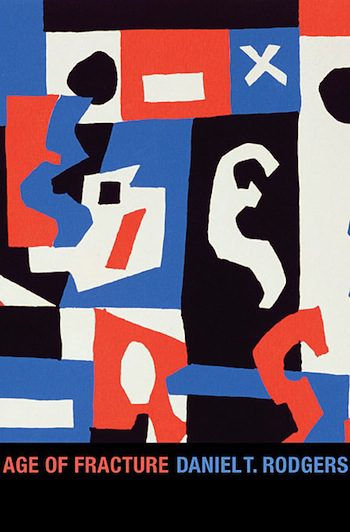By Chris Babits
Have you recently found yourself wondering, “How did we get here?” Turning on the news — or jumping on social media — reveals a host of dramatic events and controversial issues: protests about the death of young black men at the hands of police; economic policies that benefit the wealthiest Americans at the expense of the middle- and lower-classes; and debates over the meaning of “feminism,” with Time Magazine even suggesting that we expunge that word from our vocabulary. Daniel T. Rodgers, a historian at Princeton, offers an interpretation that helps us understand the concerns currently dominating political, intellectual, and cultural life.
In Age of Fracture, the 2012 winner of the Bancroft Prize, Rodgers argues that, between 1970 and 2001, a key intellectual and cultural shift took place. The dominant tendency of the age, Rodgers contends, was toward disaggregation. In the realm of ideas, conservatives and liberals wrote and talked less about society as a whole and more about individuals, contingency, and choice. Structural macroeconomics gave way to notions of a flexible and instantly emerging market. After the Civil Rights Movement and second wave feminism, racialized and gendered identities became fluid, intersectional, and elective. And power itself thinned, receded, and sometimes appeared to be simultaneously everywhere and nowhere. Rodgers persuasively shows how these ideas weren’t restricted to academic and political circles. They shaped the mental frameworks and social experiences of everyday Americans.
Rodgers makes complex political, economic, intellectual, and cultural changes easy to understand. Beginning with presidential rhetoric and the rediscovery of classical economics, he demonstrates that Ronald Reagan and his speechwriters used the terms “freedom” and “market” as vague concepts that inspired hope and optimism. This shift in rhetoric led Americans to see freedom and individualism linked to tax cuts. However, Reagan was only one proponent of the new economic ideas that gained prominence after the financially tumultuous 1970s. These new theories, with Milton Friedman as their foremost champion, shifted concerns from macroeconomics to the microeconomics of individual actors. Reagan proposed supply-side economics, which included massive tax cuts for corporations and the wealthiest Americans, promising that wealth would “trickle down” to the middle- and lower-classes. These trends endured through George W. Bush’s presidency and were apparent in bestsellers like Freakanomics (2005) and The World is Flat (2005). Protest movements like Occupy Wall Street and the increased political role of Senator Elizabeth Warren highlight the ways some Americans are rejecting the effects of Friedman’s ideas and Reagan’s policies based on linking freedom with the marketplace.
Rodgers’ chapters on power, race, and gender provide additional insight into how American society got to where it is today. On the issue of power, Rodgers demonstrates how this term became an all-consuming concern of academics. Political scientists, sociologists, historians, and anthropologists engaged with power in ways that highlighted the significance of language, symbols, and consciousness. For historians, Rodgers argues, the search for power led to the virtual abandonment of class-based interpretations of the past in favor of cultural history. And Rodgers does something that many graduate students and general readers thought impossible — he makes Michel Foucault’s ideas accessible. Foucault, one of the most influential and controversial intellectuals of the past fifty years, emphasizes “capillaries of power” at work in the smallest of daily transactions. His notions of power were built from the ground up, showing how political hierarchies were reproduced and normalized – making them almost invisible – in everyday life. Foucault’s Discipline and Punish and A History of Sexuality, Volume I: An Introduction remain required reading for advanced undergraduates and graduate students in America’s colleges and universities.
Like Foucauldian power, ideas about gender and race became fractured between 1970 and 2001. During the Civil Rights Movement, there developed a popular belief in the need for unified black protest and action. A similar thing happened early in second wave feminism. But, Rodgers provides thought-provoking examples and analyses of the disaggregation of the unified black voice and of a unified female experience. By referencing scholars like sociologist William Julius Wilson, who wrote about the intersection of race and class, Rodgers traces the disappearance of racial and feminist solidarity. As a result, America has seen less collective black protest as economic and other differences divide African Americans and women in the United States. By the late-1980s, historian Joan Scott’s influential works about the construction of gender and philosopher Judith Butler’s concept of gender performativity, challenged the vision of a common and united womanhood. In the late-1960s, gender was determined by one’s biological sex. Over the past four decades, though, historians, cultural theorists, and others recognize that society helps construct what we view as masculine and feminine. As intellectuals complicated ideas about gender and class and other differences became more visible, Rodgers argues, movements based on gender equality, fractured, and multiplied.
Rodgers’ Age of Fracture is well-written, cogently argued, and timely. It includes additional discussions about school and university curricula, multiculturalism, and the impact of the terrorist attacks on September 11, 2001. Readers might not agree with all of the connections Rodgers makes, but Age of Fracture will help readers think not only about the recent past but also the world they currently live in.
Daniel T. Rodgers, Age of Fracture (Harvard University Press, 2011)
You may also like:
Important books on Modern Economic History
John Taylor Vurpillat on Michael McGerr’s A Fierce Discontent (2003)
Simon Miles reviews Gail E. S. Yoshitani’s Reagan on War: A Reappraisal of the Weinberger Doctrine, 1980-1984 (2012)

All images via Wikimedia Commons.






